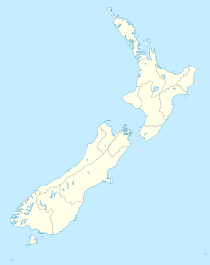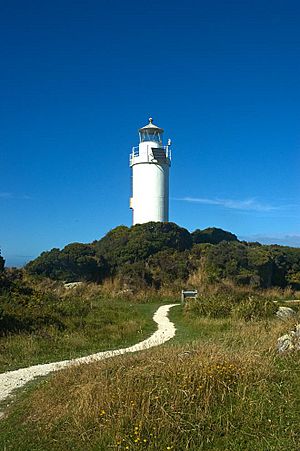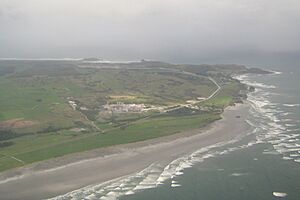Cape Foulwind facts for kids
Cape Foulwind is a special piece of land that sticks out into the Tasman Sea. It's located on the West Coast of New Zealand's South Island. You can find it about ten kilometres west of the town of Westport.
The first European to see this place was Abel Tasman in 1642. He called it Rocky Cape. Later, in 1770, the famous English explorer James Cook gave it its current name. He called it Cape Foulwind because his ship, the Endeavour, was blown far offshore by strong winds near this point.
Contents
Amazing Wildlife
Cape Foulwind is a fantastic place to see different kinds of animals.
Fur Seals
At Tauranga Bay, which is part of Cape Foulwind, there's a busy breeding colony of fur seals. You can easily visit them using a well-kept walking track. This track, called the Cape Foulwind Walkway, goes over rolling farmland and along the beautiful coast. It stretches from the main Cape Foulwind Road all the way to Tauranga Bay.
Dolphins and Whales
You might also spot several types of dolphins swimming in the waters around Cape Foulwind. This includes the unique Hector's dolphins, which are only found in New Zealand. Sometimes, even killer whales, also known as orcas, visit the area.
While still rare, some whales are slowly returning to these waters. For example, southern right whales are starting to make a comeback.
Little Blue Penguins
There are also blue penguins living here. However, they are very shy and hard to spot. Sadly, the number of fur seals and penguins in the area seems to be getting smaller.
Other Interesting Spots
Cape Foulwind has more to explore than just its wildlife.
The Lighthouse
A tall lighthouse stands proudly at Cape Foulwind. It helps guide ships safely along the coast.
Carters Beach
Close to the cape, near the mouth of the Buller River, you'll find Carters Beach. Many people say this is the only safe beach for swimming on the entire West Coast of the South Island.
Old Cement Works
Near the cape, there used to be a very large factory that made cement. It was built there because the area had lots of limestone, sand, and clay, which are all needed to make cement. There were also coal mines nearby to provide fuel. This factory is now closed.
Images for kids
 | Madam C. J. Walker |
 | Janet Emerson Bashen |
 | Annie Turnbo Malone |
 | Maggie L. Walker |






